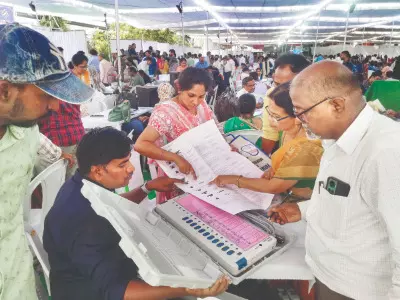
New Delhi, Nov. 3 -- The Election Commission of India (EC) will launch the second round of its Special Intensive Revision (SIR) exercise on Tuesday, covering nine states and three Union territories with a combined electorate of around 51 crore. The large-scale revision of the electoral rolls will conclude with the publication of the final voter list on February 7, 2026.
This marks the second phase of the SIR, following its implementation in Bihar, where the final electoral roll containing nearly 7.42 crore names was published on September 30. The new phase will include the Andaman and Nicobar Islands, Lakshadweep, Chhattisgarh, Goa, Gujarat, Kerala, Madhya Pradesh, Puducherry, Rajasthan, Tamil Nadu, Uttar Pradesh, and West Bengal.
Among these, Tamil Nadu, Puducherry, Kerala, and West Bengal are due for assembly elections in 2026.
Assam, another state headed for polls that year, will not be part of this round due to an ongoing Supreme Court-supervised verification of citizenship under the provisions of the Citizenship Act.
"Under the Citizenship Act, there are separate provisions for citizenship in Assam. Under the supervision of the Supreme Court, the exercise of checking citizenship is about to be completed. The June 24 SIR order was for the entire country. Under such circumstances, this would not have applied to Assam," Chief Election Commissioner Gyanesh Kumar said on October 27. He added that a separate SIR schedule will be announced for the state once the verification process concludes.
The SIR will begin with the enumeration stage on November 4 and continue until December 4. Draft electoral rolls will be released on December 9, followed by the final publication on February 7, 2026. This will be the ninth such revision since independence, the last one having taken place between 2002 and 2004.
According to the EC, the SIR aims to ensure that no eligible citizen is left out of the rolls while removing ineligible names, including illegal migrants. The process involves verifying voters' place of birth, which officials say will help identify non-citizens, particularly in light of recent crackdowns on illegal migrants from Bangladesh and Myanmar.
The voter list last prepared under SIR will serve as a baseline, similar to how the 2003 Bihar rolls were used for intensive revision. Most states have now completed mapping their current electorates against records from the 2002-04 SIR period.
The Commission has also revised its procedure based on feedback from Bihar. Unlike the earlier round, voters will not be required to submit documents during enumeration. Instead, individuals who cannot be linked to the previous SIR rolls of their state will be asked to provide documents only if served a notice by the electoral registration officer.
In addition to the Aadhaar card, the updated list of indicative documents now includes the voter list of Bihar published after its SIR exercise.
When SIR was rolled out in Bihar earlier this year, several political parties alleged that it could disenfranchise citizens lacking proper documents. The EC defended its initiative before the Supreme Court, asserting that "no eligible citizen of India would be left out." After the publication of Bihar's final voter list, political criticism largely subsided.
Published by HT Digital Content Services with permission from Millennium Post.
